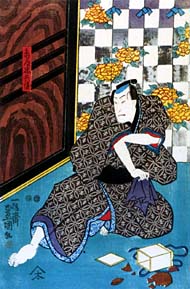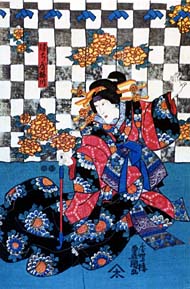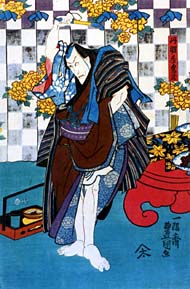| FÛIN GIRI |
| Play titles | Koi Bikyaku Yamato Ôrai Meido no Hikyaku Koi no Hikyaku Yamato Ôrai Koi no Tayori Yamato Ôrai Keisei Koi no Hikyaku Umegawa Chûbê Fûin Giri Breaking the Seals |
| Authors | Chikamatsu Monzaemon ("Meido no Hikyaku") Namiki Shôzô I ("Koi no Tayori Yamato Ôrai") Suga Sensuke, Wakatake Fuemi ("Keisei Koi no Hikyaku") |
| History |
The play "Meido no Hikyaku" was originally written for the puppet theater (Bunraku) by Chikamatsu Monzaemon and staged for the first time in Ôsaka at the Takemotoza in the 3rd lunar month of 1711. It was based on a real event that happened in Ôsaka the 5th of the 12th lunar month of 1710: a messenger named Chûbê was executed because he used some official money, which was entrusted to him, for the love of a courtesan named Umegawa. Chikamatsu Monzaemon was not the first author to work on this thema: the first drama was "Keisei Kuhonji Jôdo", which was staged in the 1st lunar month of 1711 in Kyôto at Miyako Mandayû's theater and starred Hanaoka Bunzaemon and Yamamoto Kamon in the roles of Chûbê and Umegawa. There was also a similar drama staged in Ôsaka in Spring 1711, starring Otowa Jirosaburô I and Sodeshima Genji in the roles of Chûbê and Umegawa (title unknown). Chikamatsu's rival Ki-no-Kaion wrote also his own version, entitled "Keisei Sandogasa", which was staged in the 10th lunar month of 1713 at the Toyotakeza. A Kabuki drama similar to "Meido no Hikyaku" was written by Namiki Shôzô I and staged under the title "Koi no Tayori Yamato Ôrai" (an other possible reading is "Koi no Hikyaku Yamato Ôrai") in the 7th lunar month of 1757 in Ôsaka at the Ônishi no Shibai (casting unknown). Another drama, which had a deep impact on the current contents of "Koi Bikyaku Yamato Ôrai", was written for the puppets by Suga Sensuke and Wakatake Fuemi, which was staged under the title "Keisei Koi no Hikyaku" in the 12th lunar month of 1773 at the Toyotakeza. It was adapted for Kabuki in the 2nd lunar month of 1796 at the Kado no Shibai [casting]. |
| Structure |
"Fûin Giri" is the first act of "Koi Bikyaku Yamato Ôrai". |
| Key words |
Ganjirô Jûnikyoku Kuruwa Miuke Sewamono Shinjûmono Shinmachi |
| Summary |
In the evening the bustling quarters of Shinmachi in Ôsaka are filled with the charming voices of courtesans and their clients. There is to be a banquet in a tea house under the auspices of a rich client devoted to Umegawa, a popular courtesan from the tea house Tsuchiya. But she is not feeling well, because her lover, Kameya Chûbê, has not come to visit her for several days. Chûbê, one of a farmer's many children, married into a family which owns and operates a courier service, Kameya. He had been paying frequent visits to Umegawa at Tsuchiya; they fell deeply in love; and then they continued to meet quietly behind his adopted parents' backs. Recently, however, a rich man from the country has decided that he wants to redeem Umegawa. So Chûbê must come up with an even greater amount for her redemption or lose her. Chûbê has managed to pay 50 ryô as an advance deposit, but couldn't scrape up the balance. And this is why he has been avoiding Umegawa. To make matters even more complicated, Chûbê's friend and rival for Umegawa's affection, Tanbaya Hachiemon, also offers to redeem Umegawa. Umegawa writes to Chûbê asking him to meet her at Izutsuya, another tea house. Chûbê arrives with her letter as she is lamenting to Oen, the mistress of the tea house, about her misfortunes. Chûbê is depressed over his inability to come up with the money for Umegawa's redemption. Oen, who has a deep sympathy for the young couple, lets them use one of her rooms to meet in and talk things over. But she suggests that this should be their last meeting and that they should reconcile themselves to their imminent separation. Chûbê, however, cannot bear the thought of giving up Umegawa. After he assures her that he will somehow get the rest of the money, they beseech Oen to convince Tsuchiya Jiemon to wait for a few more days. A while later, Jiemon drops by. Explaining that he is deep in debt, he urges Umegawa to accept Hachiemon's kind offer. With great embarrassment, Umegawa desperately entreats Jiemon to wait a little while longer, because Chûbê's offer was made earlier than Hachiemon's. If she accepts the latter, everybody in the gay quarters will look down upon her. Moved by this sincere appeal. Jiemon becomes sympathetic and finally consents to give Chûbê a little more time. Chûbê and Umegawa disappear upstairs just before Hachiemon makes his entrance and brazenly displays 250 ryô, the whole amount required for Umegawa's redemption. When Jiemon flatly refuses the offer, Hachiemon gets upset and begins to disparage Chûbê. "Chûbê," he says, "embezzled money from his father-in-law's business and asked me to lend him 50 ryô in order to cover up the matter. I couldn't refuse, because he threatened to commit suicide otherwise." Hachiemon asserts that 50 ryô is just a small amount of money to him, but is a great deal to Chûbê. He is sure that Chûbê will never be able to pay him back, let alone raise enough money to redeem Umegawa. Having overheard the discussion, Chûbê can't stand to listen anymore and rushes downstairs to refute Hachiemon's remarks. He claims that his father has just recently sent him some money from home. Calling his bluff, Hachiemon asks him where he' s keeping all this money. And Chûbê lets him touch a bundle of money he has tucked inside his kimono. It is, in fact, money that he's taking care of for a samurai customer. Teasing him that it must be counterfeit, Hachiemon dares him to break the seal and let them see for themselves. When Chûbê complies, everyone around him is horrified. The law stipulates that a trader, like Kameya, who appropriates a customer's money for his own use should be sentenced to death. Now there is no turning back. While everyone stares at him with bated breath, he lays the gold coins out on the tatami and counts out 300 ryô. Hachiemon gets an uneasy feeling when he realizes his own responsibility in the matter and hurries home. Chûbê hands 250 ryô to Jiemon to cover the balance of Umegawa's redemption money and the remaining 50 ryô to Oen for all her help. Thus the redemption has been completed. Oen and her companions leave to supervise the necessary formalities. No sooner has Oen left than Chûbê tries to leave the tea house with Umegawa. For him there is no escape except to commit suicide. He asks her to accompany him to heaven right then. But she says that she'd prefer to be his wife even for only three days before she dies. Having taken care of the formalities, Oen returns. Though everyone around them seems to be very happy for the young couple, Umegawa and Chûbê seem somewhat depressed. Umegawa gives ornamental hairpins and some of her other possessions to her attendants as keepsakes, while Chûbê gives a little money to Oen, outwardly as a congratulatory gift, but tacitly as their funeral expenses. They have decided to walk the road of death hand in hand. This summary has been written by Watanabe Hisao and edited by Jeff Blair [website] |
| Trivia |
It is a custom for the actors playing the roles of Kameya Chûbê and Tanbaya Hachiemon to use lots of ad-libs in their quarrel and to change them every day. |
 |
 |
 |
|
The actors Sawamura Chôjûrô V, Onoe Baikô IV and Ichikawa Ebizô V playing the roles of Kameya Chûbê, the courtesan Umegawa and Tanbaya Kizô in the "Fûin Giri" scene of the drama "Koi Bikyaku Yamato Ôrai", which was staged in the 3rd lunar month of 1851 at the Kawarasakiza (print made by Utagawa Toyokuni III) "Fûin Giri" on YouTube: March 1963 [Kabuki Historical Recordings] |
||
|
|
| Contact | Main | Top | Updates | Actors | Plays | Playwrights | Programs | Links | FAQ | Glossary | Chronology | Illustrations | Prints | Characters | Derivatives | Theaters | Coming soon | News |